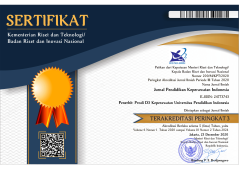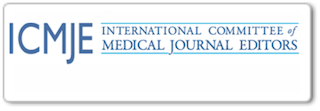Determinants of Anxiety, Stress, and Depression of Nurses during the COVID-19 Pandemic of Omicron Variant
Abstract
The Omicron variant is a new variant of the Coronavirus which is thought to be able to spread and infect humans faster than the previous variant. The rapid transmission of the disease and the high mortality cause great panic and anxiety nr the general public and the health sector. One of the health workers who are very vulnerable to receiving the impact of the emergence of COVID-19 is nurses. In addition to being directly infected, psychological disorders such as anxiety, stress, and depression are very easily experienced by nurses due to various causes. This study aimed to know the determinants of anxiety, stress, and depression during the COVID-19 pandemic of the Omicron variant. The research method is a quantitative study with a cross-sectional approach. This research was conducted in the adult inpatient room at the RSUD Kota Bandung in February 2022. The respondents were 64 nurses with a total sampling technique. The research instrument used a Depression Anxiety Stress Scale-42 (DASS-42) questionnaire, which was collected via a google form. The data were analyzed using Pearson chi-square test. The results showed that a small proportion of nurses experience mild to moderate anxiety, stress, and depression. The bivariate test showed no significant relationship between age, gender, education, and length of work with anxiety, stress, and depression (p>0.05) in nurses in the adult inpatient room at the RSUD Kota Bandung. Although small, there are still nurses who experience stress, anxiety, and depression, so the hospital should provide training on how to deal with anxiety, stress, and depression for nurses to have adaptive coping mechanisms when anxiety, stress, or depression occurs.
Keywords
References
Abudi, R, Mokomdopis, Y. Magulili, A.N. (2020). Stigma terhadap orang positif covid-19. Journal of Health Sciences and Research, 2(2), 77-84.
Ariasti, D., & Handayani, A.,T. (2019). Hubungan tingkat kecemasan dengan motivasi kerja perawat di RSUD dr. Soeratno Gemolong. Kosala JIK, 7(1), 19-28.
Chew, N.W.S., Lee, G.K.H., Tan, B.Y.Q., Jing, M., Goh, Y., Ngiam, N.J.H., Yeo, L.L.L., Ahmad, A., Ahmed, K.F., Napolean, S. G., Sharma, A.K., Komalkumar, R.N., et al. (2020). A multinational, multicentre study on the psychological outcomes and associated physical symptoms amongst healthcare workers during COVID-19 outbreak. Brain Behav Immun, 8(88), 559-565.
Dinah, D., Rahman, S. (2020). Gambaran tingkat kecemasan perawat saat pandemi COVID 19 di negara berkembang dan negara maju. Dinamika Kesehatan: Jurnal Kebidanan dan Keperawatan, 11(1), 37-48.
Elbay RY, Kurtulmuş A, Arpacıoğlu S, Karadere E. (2020). Depression, anxiety, stress levels of physicians and associated factors in Covid-19 pandemics. Psychiatry Res, 290, 1-5.
Fadli, F., Safruddin, S., Ahmad, A.,S., Sumbara, S., & Baharuddin, R. (2020). Faktor yang mempengaruhi kecemasan pada tenaga kesehatan dalam upaya pencegahan COVID-19. Jurnal Pendidikan Keperawatan Indonesia, 6(1), 57–65.
Greenberg, N., Docherty, M., Gnanapragasam, S., Wessely, S. (2020). Managing mental health challenges faced by healthcare workers during covid-19 pandemic. BMJ, 368, 1-3.
Kang, L., Ma, S., Chen, M., Yang, J., Wang, Y., Li, R., Yao, L., Bai, H., Cai, Z., Xiang Yang, B., Hu, S., Zhang, K., Wang, G., Ma, C., Liu, Z. (2020). Impact on mental health and perceptions of psychological care among medical and nursing staff in Wuhan during the 2019 novel coronavirus disease outbreak: A cross-sectional study. Brain Behav Immun, 87, 11-17.
Liu, X., Kakade, M., Fuller, C. J., Fan, B., Fang, Y., Kong, J.,Wu, P. (2012). Depression after exposure to stressful events: lessons learned from the severe acute respiratory syndrome epidemic. Compr Psychiatry, 53(1), 15-23.
Lovibond, P.F., & Lovibond, S.H. (1995). The structure of negative emotional states: Comparison of the Depression Anxiety Stress Scales (DASS) with the Beck Depresion and Anxiety Inventories. Behaviour Research and Therapy, 33(3), 335-343.
Muttaqin, D., Ripa, S. (2021). Psychometric properties of the Indonesian version of the Depression Anxiety Stress Scale: Factor Structure Reliability, Gender and Age Measurement Invariance. Psikohumaniora: Jurnal Penelitian Psikologi, 6(1), 61-76.
Pasaribu, P. D. L. B., & Ricky, D. P. (2021). Tingkat Stres Perawat Terkait Isu Covid-19. Jurnal Penelitian Perawat Profesional, 3(2), 287-294.
Said, R.M., El-Shafei, D.A. (2021). Occupational stress, job satisfaction, and intent to leave: nurses working on front lines during COVID-19 pandemic in Zagazig City, Egypt. Environ Sci Pollut Res Int, 28(7), 8791-8801.
Shen, M., Xu, H., Fu, J., Wang, T., Fu, Z., Zhao, X., Zhou, G., Jin, Q., Tong, G. (2020). Investigation of anxiety levels of 1637 healthcare workers during the epidemic of COVID-19. PLoS One. 15(12), 1-10.
Vikawati, N.E., Nurrahma, H.A., Hardini, I.T., Hidajati, E.N. (2021). Tidak didapatkan kecemasan pada petugas kesehatan dalam menghadapi pandemi Covid-19. Syifa' MEDIKA: Jurnal Kedokteran dan Kesehatan, 11(2), 116-125.
Zheng, R., Zhou, Y., Fu, Y., Xiang, Q., Cheng, F., Chen, H., Xu, H., Fu, L., Wu, X., Feng, M., et al. (2021). Prevalence and associated factors of depression and anxiety among nurses during the outbreak of COVID-19 in China: A cross-sectional study. Int J Nurs Stud, 114, 1-8.
DOI: https://doi.org/10.17509/jpki.v8i1.46091
Refbacks
- There are currently no refbacks.
Jurnal Pendidikan Keperawatan Indonesia(JPKI) published by Indonesia University of Education. JPKI is licensed under a Creative Commons Attribution-ShareAlike 4.0 International License.
Office :
Nursing Department. FPOK UPI.
229, Dr. Setiabudhi Street. Bandung 40154
West Java , Indonesia
E-mail : jpki@upi.edu

_.png)
_.png)
_.png)











